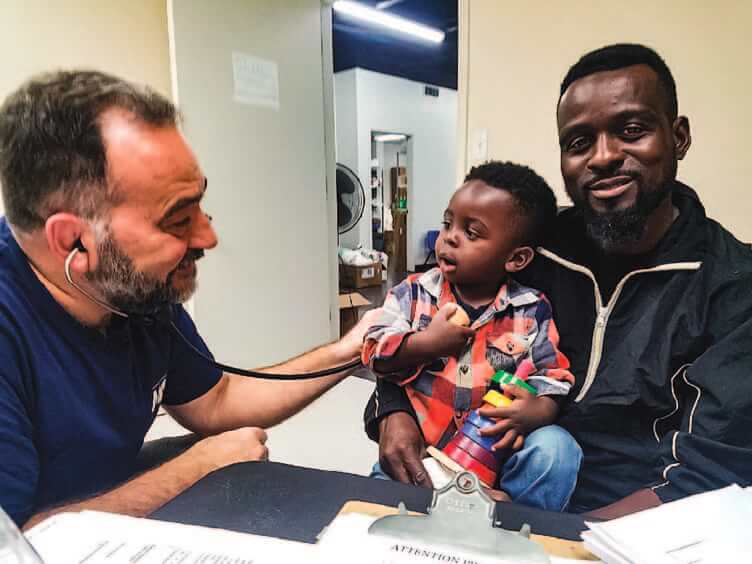
Access to pediatric psychology and behavioral health services are critical for some migrants, like agricultural worker families, to achieve well-being, yet many struggle to gain access to specialty care while migrating. Children with learning disabilities require special kinds of care and need evaluations to get the proper education that matches their needs. Migrant Clinicians Network’s SCAN (Specialty Care Access Network) program helps children in need of specialized care and resources when migrant families arrive in the United States. In 2023, SCAN assisted 78 infant patients and 238 child patients from all over the world.
Children with special needs face difficulties regardless of immigration status, says Laszlo Madaras, MD, MPH, Chief Medical Officer for Migrant Clinicians Network. “Even children with insurance… can struggle to get care because there are so few practitioners for pediatric psychology in many parts of the country,” said Dr. Madaras. “Many of these children are also traumatized, going through dangerous crossings like the Darién Gap. This trauma can inhibit normal psychological development, and with children who already have developmental delays, can have a devastating impact on their growing years.”
Three patients, two with autism and one with cerebral palsy, were among those registered in the SCAN program in 2023. Former Health Network Associate Camila Velasquez spent hours communicating and coordinating with the parents of the SCAN patients, along with interpreters, health centers, and other community organizations in the receiving community, to coordinate not just the child’s complex medical care, but also connection to basic services like school enrollment support. Additionally, and most critically, Velasquez leaned on MCN’s network of SCAN champions: volunteer pediatricians and pediatric specialists. Across the country, SCAN champions work with our team to refer patients to specialists that meet their needs, using their existing network and expertise to find the right match for our patients.
While most of MCN’s staff is bilingual in English and Spanish, allowing for ease of communication with Spanish-speaking migrants coming from Latin America, MCN frequently requires outside interpretation services for migrants coming from other locations. To help a Russian five-year-old with autism, we had to rely on interpretation services and the hard work of a community health center. The patient needed an evaluation in order to enroll in school as a student with special needs. This can be a difficult process for a recent immigrant parent, but it ensures the best possible education for their child’s needs.
“I reached out to the patient's family a total of nine times,” Velasquez said. “I reached out to the federally qualified health center (FQHC) a total of five times. The hard part was the language barrier. The patient's mom would use Google to translate when we would message each other, and we used an [interpretation] line during calls.”
“What stood out to me was how quick and efficient the FQHC I sent them to was when it came to getting them care. When a patient is in that area, I know exactly where to send them now,” Velasquez said.
Our SCAN program typically relies on SCAN champions. This case was an unusual one, as the fast and responsive FQHC found the proper care for our patient before there was a need to engage a SCAN champion in the region to find support for the patient.
Another patient, a five-year-old from Ecuador with autism and a speech delay who moved to a major metropolitan area with her family, needed a SCAN champion. “The hardest part of this case was getting them the care the patient needed. For diagnoses such as autism and developmental delays, it unfortunately takes time to get them into therapy or get them evaluated,” Velasquez explained.
Our SCAN champion in the area accelerated this, connecting the patient to a university hospital that was equipped to meet the needs of the patient. “Using a SCAN champion expedited the appointment process, including evaluations and checkups,” Velasquez said. “The patient was also approved for family care insurance offered in the state and was connected to a speech therapist.”
Another patient, one with cerebral palsy, arrived in the Southwest from Mexico. At six years old, the patient required regular appointments and a wheelchair. Due to the specific nature of the patient’s needs, Velasquez called on two SCAN champions to assist. “The patient was able to be cared for by a colleague of the champions,” Velasquez said. A patient navigator from the health center also assisted, connecting the family to financial services before regular appointments started, answering questions, and helping the family feel confident their child would receive the care they needed and that they would have financial support throughout the process. “The next day was fully focused on the patient's care,” she added, explaining how the patient navigator was able to ease their concerns and allow them to focus entirely on the needs of their child. “The patient's parents were so happy with the level of care they received and thanked me for connecting them.”
Velasquez served these three patients while simultaneously managing a full caseload of other patients with complex needs moving all around the country, including one child with a ventricular septal defect, and one child with a heart murmur. The SCAN program and its champions help young patients and their families every day, easing the stress of caring for a sick or disabled child and helping recent immigrants navigate our complex health care system with the input of case managers, pediatricians, and specialists. This work saves lives -- but it also ensures a quality of life for families that need support, like the families of the children with disabilities in need of evaluations, wheelchairs, and education resources.
Learn more about SCAN and its parent program, Health Network, on the Health Network page: https://www.migrantclinician.org/our-work/health-network.html